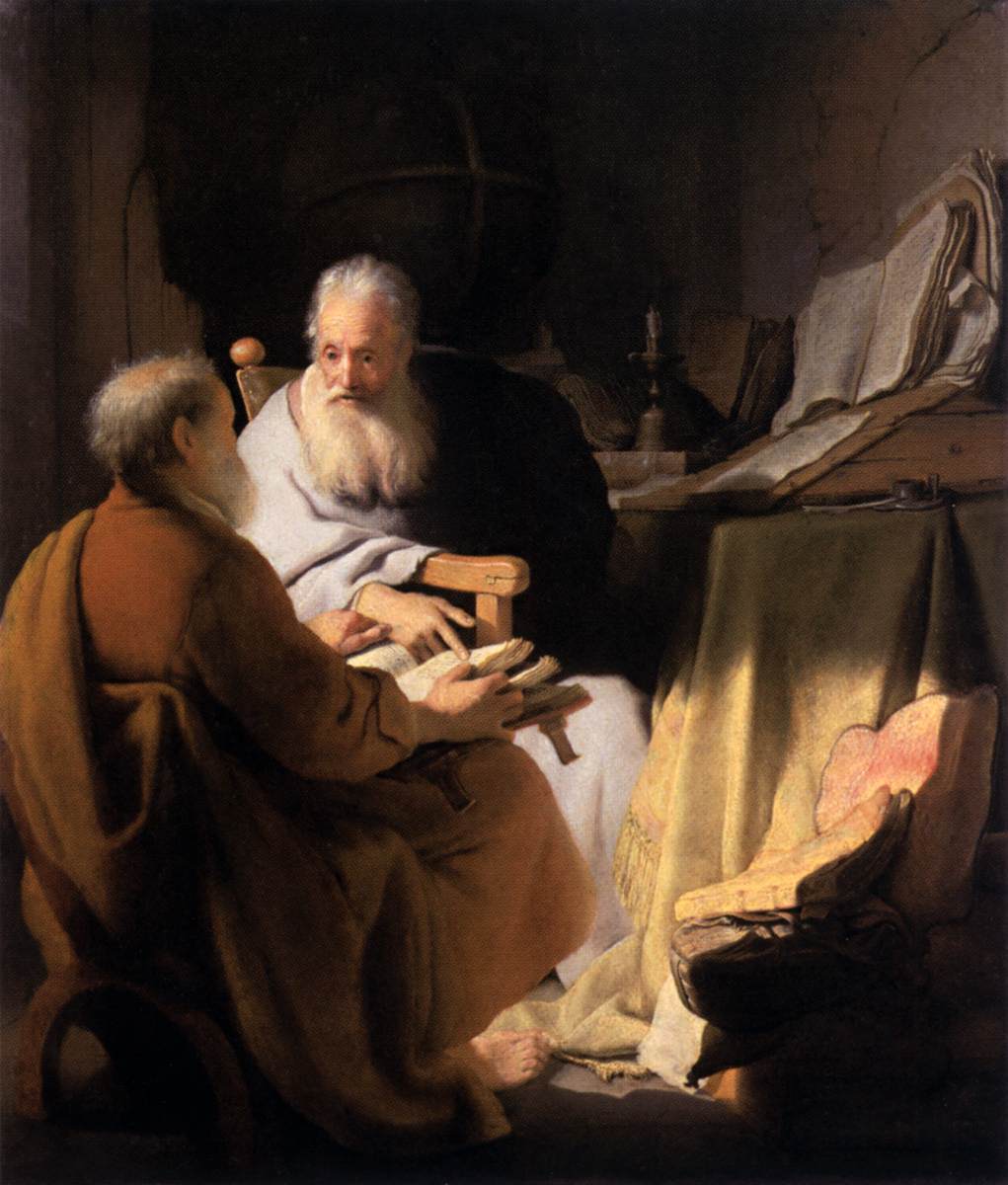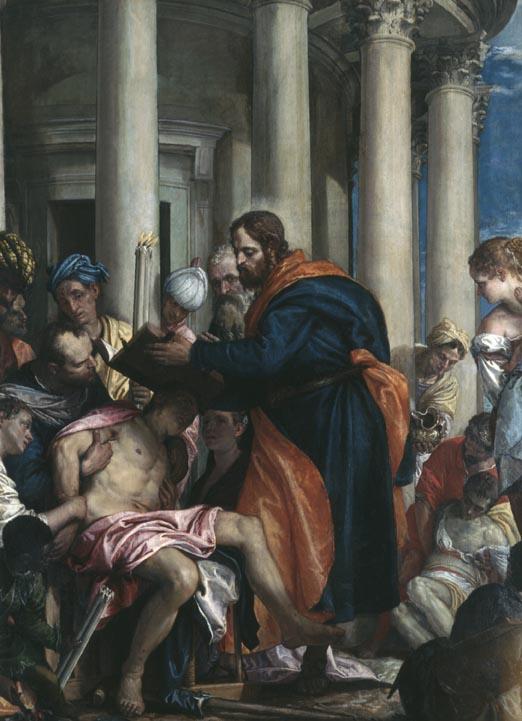* * * *

* * * *
June 29 is the Feast of Saints Peter and Paul, honoring the “martyrdom in Rome of the apostles Saint Peter and Saint Paul.” It’s an ancient celebration, and the date is “the anniversary either of their death or of the translation of their relics.” Remember that in January we celebrate each man – each saint – on separate dates, but in June we celebrate both men together:
On 29 June we commemorate the martyrdoms of both apostles. The date is the anniversary of a day around 258, under the Valerian Persecution, when what were believed to be the remains of the two apostles were both moved temporarily to prevent them from falling into the hands of the persecutors.
(See St. Peter & St. Paul, a link from Satucket.com.) So on June 29 we remember both men being martyred at about the same time, and their bodily remains being “translated” near that same time. (Early Christians moved the remains – called “relics” – into hiding so unbelievers couldn’t desecrate them. For more on “translation of relics” see my 2015 post.)
Back on topic: The Peter & Paul article said the Bible doesn’t mention the deaths of either man, “or indeed any of the Apostles except for James the son of Zebedee.” (Acts 12:2.) But early tradition said they were martyred at the command of Emperor Valerian in Rome, and buried there:
As a Roman citizen, Paul would probably have been beheaded with a sword. It is said of Peter that he was crucified head downward[. And thus as St. Augustine wrote,] “even though they suffered on different days, they were as one. Peter went first, and Paul followed. And so we celebrate this day made holy for us by the apostles’ blood…”
On the topic of scholars disputing, see Wikipedia on the Feast of Peter and Paul. It includes a link to the Incident at Antioch. That dispute – between two prominent Church Fathers – continues to this day. It involved circumcision as prerequisite for becoming a Good Christian. Specifically, the dispute involved whether all new non-Jewish converts – “Gentile Christians” – had to follow all the laws, rules and regulations of the Jewish faith to be real Christians. (Put another way, “legalism” versus “grace.”) As the Incident at Antioch article said:
[T]he issue of Biblical law in Christianity remains disputed to this day. The Catholic Encyclopedia states: “St. Paul’s account of the incident leaves no doubt that St. Peter saw the justice of the rebuke…” In contrast, L. Michael White’s From Jesus to Christianity states: “The blowup with Peter was a total failure of political bravado, and Paul soon left Antioch as persona non grata, never again to return.”
Wikipedia added, again, that the “final outcome remains uncertain resulting in several Christian views of the Old Covenant to this day.” And speaking of good Christians arguing vehemently – yet still able to work together – see Galatians 2:11-15, where “Paul Rebukes Peter at Antioch:”
When Cephas [Peter] came to Antioch, I opposed him to his face, because he stood self-condemned; for until certain people came from James, he used to eat with the Gentiles. But after they came, he drew back and kept himself separate for fear of the circumcision faction. And the other Jews joined him in this hypocrisy…
So in this case, Paul basically got mad at Peter for being two-faced about the Lord’s Supper. And there’s another aspect: Whether you are “saved” by following a set of rules and regulations, or by faith in Jesus alone. See The Controversy Over Faith And Works Continues. While some Christians say you are “saved” by following a set of rules, Paul clearly came down on the side of faith. Galatians 2:16: “Know that a person is not justified by the works of the law, but by faith in Jesus Christ.” (But see also the Apostle James, that “faith without works is dead.”)
Then there’s the tension between Deuteronomy 19:16-19 and Ezekiel 3:16-19.
Briefly, Deuteronomy 19:16-19 says if you accuse someone of a heinous crime – say, murder or heresy – and it’s not true, you will be punished as if you did the crime yourself. (You can’t blithely make false accusations and not face consequences.) For example, if you accuse someone – maybe a fellow Christian – of being a “heretic,” and that’s false, you will be punished as a heretic yourself. (Some conservatives have said liberalism is heresy, and some arch-conservatives called Billy Graham “Antichrist” for being too ecumenical later in life.)
On the other hand there’s Ezekiel 3:16-19. There “Zeke” wrote about a Believer’s duty to warn others of the error of their ways. (“Ezekiel’s Task as Watchman.”) Briefly, if you don’t warn a fellow citizen of the error of his ways, and he keeps sinning, God will punish both of you. But if you warn him and he keeps on sinning you will have saved your own spiritual butt: “They will die for their sin; but you will have saved yourself.”
Thus a dilemma. If you tell someone “you’re going to hell for being a heretic” you could end up in hell yourself. On the other hand if you think someone may be committing the Unforgiveable Sin – and you don’t warn him – you may be punished for the “sin unto death” yourself. (Could it be a matter of extremely careful grammar? “Excuse me, I think you may be guilty of…”)
What you end up with is one more dynamic tension in the Bible. Which leads to this conclusion: The Bible isn’t one book giving a “one size fits all” set of answers to all life’s questions. (What many people expect.) Instead it’s a library, containing at least 66 different books, depending on the translation and whether it includes Apocrypha. And aside from John 6:37 and Romans 10:9, those books often raise more questions than provide answers. That includes Gloomy Gus books like Ecclesiastes and Job, both of which most people find extremely depressing.
Which is to say the Bible recognizes that sometimes life is unfair, and that quite often Bad Things Happen to Good People. But all that seems necessary for spiritual growth. To grow – whether spiritually or physically – we need to set up, meet and overcome resistance. (In Weight Training you literally kill muscle cells, which then grow back stronger.)
Thus the Bible’s dynamic tension is a form of spiritual resistance training, so that the more you train the more you will grow in the grace and knowledge of our Lord and Savior. (2d Peter 3:18.) Bottom Line? Real life isn’t simple, and the Bible’s 66 books reflect that. Fortunately we have good old John 6:37 and Romans 10:9 to fall back on. (“If you confess with your mouth that Jesus is Lord and believe in your heart that God raised him from the dead, you will be saved.” Emphasis added.) Which makes it a lot easier to deal with the Bible’s Dynamic Tension.
* * * *

* * * *
The upper image is courtesy of Two Scholars Disputing by REMBRANDT Harmenszoon … (web gallery of art.) The explanatory section added that the most likely explanation of the painting is that it “represents St Peter and St Paul in conversation,” or even Argument:
Rembrandt omits the attributes by which the two apostles were traditionally identified, he relies only on their physical characteristics … and on what they are seen to be doing, that is earnestly discussing a text which the one (St Peter) is explaining to the other.
For other input see also canvasreplicas.com/Rembrandt, and Two Scholars Disputing by REMBRANDT Harmenszoon van Rijn.
The Book of Common Prayer reference: The “corporate-mystical” prayer is on page 339, the post-communion prayer for Holy Eucharist, Rite I.
Feast days are designated days on the liturgical (church) calendar “set aside to commemorate events, saints, or doctrines that are important in the life of the Church. These can range from Solemnities, which are the highest-ranking feast days like Easter and Christmas, to optional memorials that celebrate lesser-known saints.” Feast Days: Celebrating the Church’s Calendar.
For this post I borrowed from On Peter, Paul – and other “relics” (June 2015), John the Baptist, Peter and Paul – 2016, from June 2019, On a wedding in Hadley – and John, Peter and Paul, and On “John T. Baptist,” Peter and Paul – 2021. See also On the Bible’s “dynamic tension,” from March 2019. The latter included some conservatives saying liberalism is heresy. As to Billy Graham called “Antichrist,” see October 2018’s A Soldier of Christ – “and BEYOND!” Also Unholy war: The few evangelicals who stood up to Trump, noting that later in life Billy “expressed regret at his close connections to politicians and warned against being beholden to one party. The elder Graham’s granddaughter Jerushah was a vocal critic of Trump.”
The article What does “faith without works is dead” mean? – Bible Hub says that James 2:17-26 “does not imply that works earn salvation, but rather that true faith, once received, will necessarily manifest itself in outward conduct.”
The lower image is courtesy of Dynamic Tension Charles Atlas – Image Results. See also Dynamic Tension – Wikipedia, and Charles Atlas – Wikipedia.
* * * *




